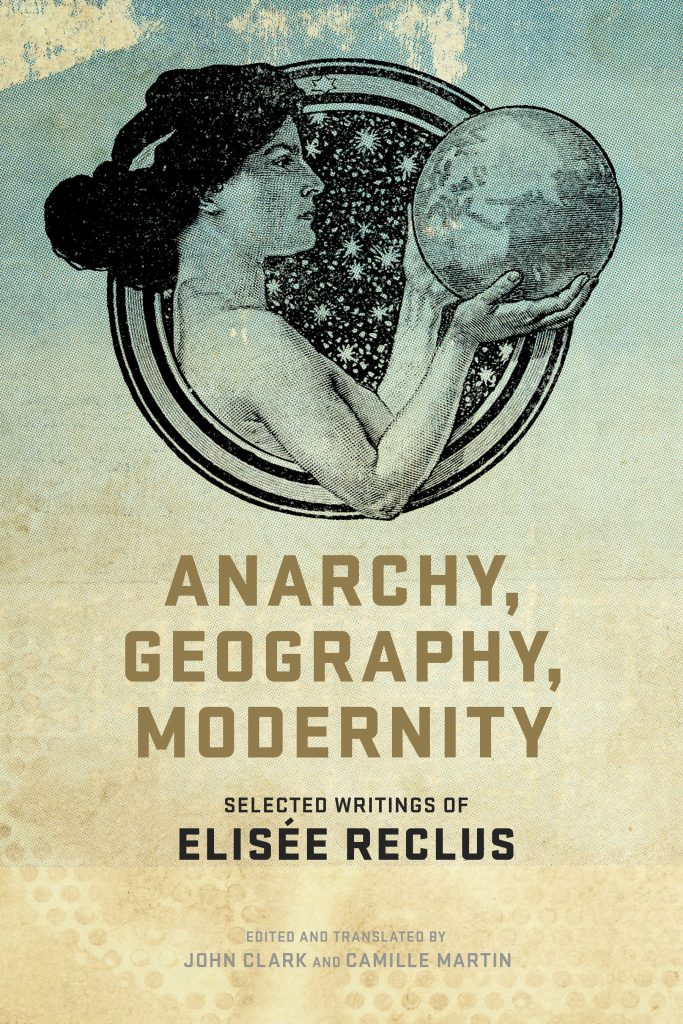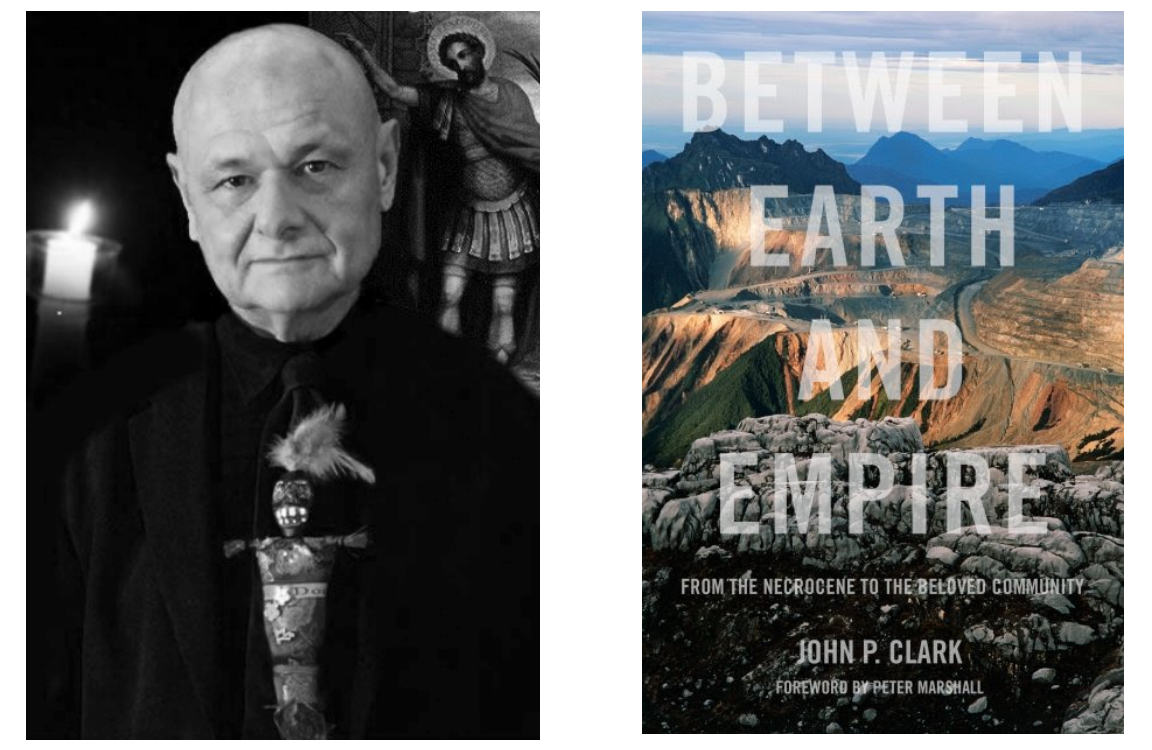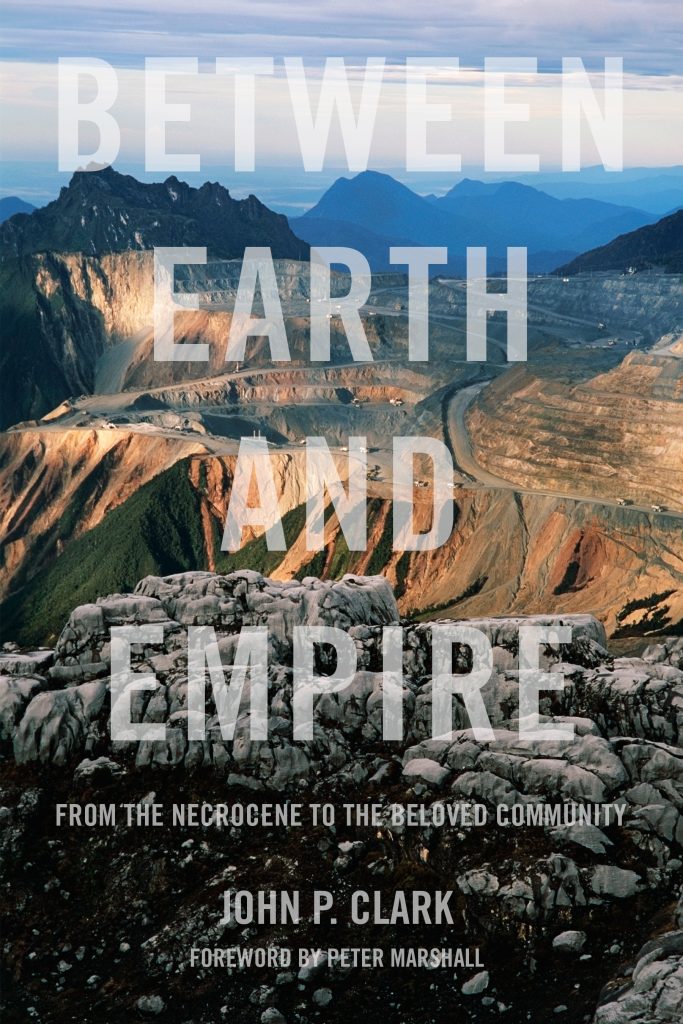By Simon Springer
The American Association of Geographers Review of Books
What if this is it? The end of life. The
final gathering darkness. The new
era of death. What if, in this somber
admission, we finally came to under-
stand that the once radiant story of
humanity, blackened by a ferocious
lust for empire, has become the tale
of the Necrocene? Far from being
another prophet of a dying world,
John P. Clark implores us to do more than shed crystalline tears. Instead, he asks “What if?” What if we could move beyond the throes of discipline and demise? What if we came to embrace our togetherness, our oneness with the biosphere, our Beloved Community? Clark’s unparalleled vision of awakening from the incantations of catastrophe is a beautiful exposition of the importance of solidarity and care. Between Earth and Empire takes us through a lucid and cautionary account of humanity’s collective estrangement from the planet that breathed life into our consciousness. It guides us toward a haunting realization that expanding our circle of compassion is not only our last hope for liberation from certain apocalypse, but has always been the poetry of our resistance.
Between Earth and Empire is comprised of four main parts, plus a preface, introduction, postscript, and appendix, a well as a foreword by the renowned anarchist writer Peter Marshall. The preface outlines some of the basic concepts found within, and the introduction identifies Hurricane Katrina and living through its after- math as the flashpoint that ultimately gave life to this book, thus setting the stage for the four main sections. Part I establishes the premise of what Clark calls the “Necrocene,” and helps to shape our understanding of how we might think and act beyond this new era of death. Part II demonstrates the other possible worlds we could live into and provides empirical exam- ples to back up Clark’s theoretical insights, illustrating that his thinking is not divorced from practicality.
Part III encourages the reawakening of our collective consciousness toward new possibilities beyond the political and economic frame of the current moment. Part IV offers a glimpse into the radical imagination and how it is possible to eschew the modes of domination that shape our beliefs about how our lives and our connections to others are structured. The postscript is an ode to the power of the poetic mind, and the appendix offers a poem to fire our radical potential and recognize our collective strength.
More than any other figure in the contemporary political ecology movement, Clark has openly embraced an anarchist perspective that brings new life and vigor to the questions we should be asking around our collective engagement with the planet, not only as a species, but as Earthlings. Clark avoids the trappings of the Anthropocene and its inherently human-centered focus in favor of a more holistic and encompassing look at the web of life that envelopes the planet, and in fact actually is the planet. The book is a deep dive into the extraordinary imagination of a man who has spent most of his life considering what a liberatory politics might look like in practice, and how that vision is equally essential for an ecological outlook.
The result in Between Earth and Empire is a breathtaking argument that captures your attention and does not let go for the duration of its nearly 340 enchanted pages. From a scathing critique of how our political systems have thrown the living Earth into the death throes of catastrophe, to a liberatory vision for today that could see significant radical transformation of our connection to all life, Clark guides the reader with a carefully constructed prose that engages like few other contemporary geographers’ writing can. Never jarring for its jargon, Clark’s work manages to provoke deep reflection in a dense argument that is easily digested owing to the skill of his pen and the beauty of his words. The awakening of a deeper sense of consciousness in ourselves as human beings, but also in the integral system that is the planet, is Clark’s overarching goal, one that he accomplishes with conviction. Between Earth and Empire is an inspired and inspiring work, and one that will fire the radical imagination in even the most stalwart of conservative readers.
To make his case for a better today, and thus a more hopeful and emancipatory tomorrow, Clark draws on his notion of the Beloved Community. He first explored this idea in his earlier work (Clark 2013), but sheds any ego in relation to its use as he recognizes that it in fact traces its roots to two- and-a-half millennia ago in the Buddhist idea of the sangha, as well as within the 2,000-year-old Christian idea of the community of agape. He uses this idea as an expression of solidarity, liberation, and the awakening of care within the community. When we dare to see the world through differ- ent eyes beyond our own narrow frames of reference, he asks us to consider how we might move this ideal of the Beloved Community into a mode of living on and with the Earth. It is in this ideal that Clark lays the groundwork for addressing the ecological crisis that is facing the planet. He pushes us to move beyond mere environmental thinking and the onto- logical trap this very notion implies, for it suggests a world of egos surrounded by an environment, rather than an integral connection, wherein there is no distinct separation between the self and the wider world. He prefers “ecology” in this regard, and draws on its etymology from the Greek terms oikos and logos to encourage readers to think of logos as the underlying meaning or truth, and oikos as the local, regional, or planetary union. With such an emphasis, ecological thinking moves us away from egocentric and anthropocentric perspectives and toward a notion of the whole, not as a totalizing or enclosed unit, but rather as a measure of an always-evolving process of becoming.
For Clark, life is both a mystery and a journey, and Between Earth and Empire makes clear that the point is not to have everything figured out as ready-made solutions. The hubris of such a position has led us to the precipice of ecological disaster, and for Clark, we instead need to embrace a certain sense of humility that enables us to bring forth a lasting social transformation through a genuine compassion, love, and care for ecology as a whole. By moving away from systems of domination and toward a greater ethic of community that extends beyond the limits of neighborhoods, nations, or even humanity, Clark believes that a process of reawakening can begin, wherein ecological regeneration and healing become possible through the realization of our shared agency. From Rojava to Chiapas, the tides are slowly turning, where through Clark’s analysis we can see that it is not the authoritarian strictures of the state that are our best hope for an ecological rebirth in the face of a rising tide of climate breakdown. We need to disassemble the very notion of the captain’s chair, and reject all allusions to the faulted idea that we are somehow masters of this domain. As the waters get rougher and the seas start to swell, it is the Beloved Community of compassion, care, and connection that locates us as fellow passengers on the good ship Earth. Only an integral view will ensure our future and see us through to safer harbors. The human odyssey has played itself out for roughly 300,000 years, and until very recently we have seen ourselves as expressions of a collective planetary purose, not something outside or above it. Returning to such a notion moves us away from the arrogance and annihilation of Empire and back toward the affinity and allure of the Earth.
Reference
Clark, J. P. 2013. The impossible community: Realizing communitarian anarchism. London, UK: Bloomsbury.








